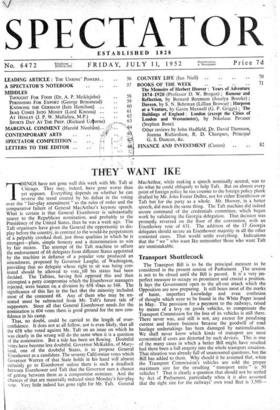THEY WANT IKE
THINGS have not gone well this week with Mr. Taft at Chicago. They may, indeed, have gone worse than yet appears. Everything depends on whether he can reverse the trend created by his defeat in the voting over the " fair-play amendment " to the rules of order and the comparativd failure of General MacArthur's keynote speech. What is certain is that General Eisenhower is substantially nearer to the Republican nomination, and probably to the Presidency of the United States, than he was a week ago. The Taft organisers have given the General the opportunity to dis- play before the country, in contrast to the would-be perpetrators of a palpably crooked deal, just those qualities in which he is strongest—plain, simple honesty and a determination to win by fair means. The attempt of the Taft machine to seEure the endorsement of 68 delegates from different States appointed by the machine in defiance of a popular vote produced an amendment, proposed by Governor Langlie, of Washington, providing that no delegate whose right to sit was being con, tested should be allowed to votc.till his status had been decided. The Taftites, having first opposed this and then attempted a petty compromise which the Eisenhower managers rejected, were beaten on a division by 658 Votes to 548. The significance of this lies in the fact that the minority included most of the contested 68. Any of them who may be un- seated must be subtracted from Mr. Taft's future tale of-- supporters. Since all that General Eisenhower needs-for the nomination is 604 votes there is good ground for the new con- fidence in his camp.
That, no doubt, could be carried to the length of over- confidence. It does not at all follow, nor is even likely, that all the 658 who voted against Mr. Taft on an issue on which he was clearly in the wrong will do the same when it is a question of the nomination. But a tide has been set flowing. Doubtful votes have become less doubtful. Governor McKeldin, of Mary- land, one of the doubtful States, is to propose General Eisenhower as .a candidate. The seventy Californian votes which Governor Warren of that State holds in his hand will almost certainly go to Eisenhower unless there is such a deadlock between. Eisenhower and Taft that the Governor sees a chance of getting between them as a compromise nominee. And the chances of that are materially reduced since Monday's fair-play vote. Very little indeed has gone right for Mr. Taft. General MacArthur, while making a speech nominally neutral, was to do what he could obliquely to help Taft. But on almost every point of foreign policy he ran counter to the foreign policy plank drafted by Mr. John Foster Dulles, not for either Eisenhower or Taft but for the party as a whole. Mr. Hoover, in a better speech, did much the same thing. The Taft machine did indeed secure command of the credentials committee, which began work by validating the Georgia delegation. That decision was promptly reversed on the floor of the convention, with an Eisenhower vote of 631. The addition of the 17 .Georgia delegates should secure an Eisenhower majority in all the other contested cases. That would settle everything. Indications that the " we " who want Ike outnumber those who want Taft are unmistakable:







































 Previous page
Previous page